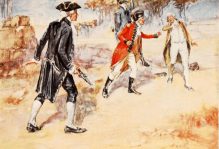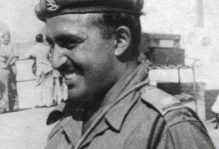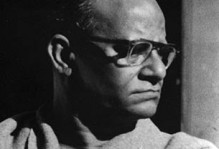Munshi Premchand Fights Back from Oblivion in Howrah, West Bengal
Shri Rakhal Chandra Chowdhury and Smt Shila Chowdhury, a lifetime dedicated to Munshi Premchand (Photo Credit: Probashi)
Editorâs Note: Munshi Premchand, one of Indiaâs most prolific author remains largely forgotten including in his home state of Uttar Pradesh. However at a house in a small residential lane in Howrah near Kolkata, Munshi Premchand is remembered and revered. And leading this is a couple Shri Rakhal Chandra Chowdhury and Smt. Shila Chowdhury, in their seventies, who have dedicated their whole life and their savings in keeping the legacy of Premchand alive. West Bengal has no dearth of literary giants, the Chowdhuryâs had a choice of luminaries like Rabindranath Thakur, Bankimchandra, Michael Madhusudan , Saratchandra and the likes to emulate and revere. How and why this Bengali couple decided to learn Hindi and translate most of Munshi Premchandâs work in Bangla is a beautiful story, a story of love for literature and its power to transcend boundaries of geography, culture and time. Probashi spoke to this couple and was humbled by the lifelong dedication for the cause of getting Munshi Premchand his due despite heavy odds. Munshi Premchand once said लà¤à¤¨ à¤à¥ à¤à¤¾à¤à¤à¥à¤ à¤à¤¿ परवाह नहà¥à¤ हà¥à¤¤à¥ | (Dedication does not care about the thorns strewn on the path); the Chowdhury couple has walked that path.
Â
At the annual Kolkata Book Fair, amidst brilliantly merchandised stalls of big publishing houses, every year one finds tucked away in the corner a small rather non descript stall of Yuva Prakashani , a publishing house which largely brings out translation of Munshi Premchandâs work in Bangla. You will only see a couple of people there, no neon signs or posters of the latest releases or salesmen doing hard sales talk. Instead you find the complete titles of one of Indiaâs best authors stacked and an encyclopaedia of information on Munshi Premchand from people manning the stall - Smt Shila Chowdhury and her daughter Surma Chowdhury (Mukherjee)
It is indeed surprising that when the world has almost forgotten this gifted author, he puts up a spirited battle in Kolkata. Lieutenants in this battle have been two extraordinary individuals who have given a life time for the cause of keeping the legacy of Premchand alive. They are Shri Rakhal Chowdhury and his spouse Smt Shila Chowdhury, residents of Howrah in the suburbs of Kolkata.
The life experiences and exposure prepared this couple for this cause. Shri Chowdhury crossed over the India border from Comilla District (now in Bangladesh) post partition of India, as a 9 year old orphan. His uncle got him admitted to the Aukland Orphanage House, Kolkata. As luck would have it, the orphanage house sent some of the children in 1955 to Anand Niketan, Wardha, a school setup by Mahatma Gandhi under his Nai Talim educational experiment. The medium of teaching at Anand Niketan was in Hindi, and it is here that Shri Rakhal Chandra Chowdhury got introduced to the Hindi literary figures of whom Premchand stood out for this teenage boy. It was here in Wardha that Shri Chowdhury read the complete works of Munshi Premchand. At Wardha Shri Chowdhury, then in his late teens, attended the Hindi Sammelan in 1960, where discussion cantered on translation of Hindi Literary Works into other Indian vernacular languages. The idea stuck, and Shri Chowdhury, then a young man initiated his work to translate Munshi Premchandâs short stories into Bangla. It started out of reverence for the author; publication of these translations was to happen many years later.
In 1963 Shri Chowdhury joined as a faculty at the Shibpur Deenobondhu Institution Branch School in Howrah. In 1965 he married Smt Shila Chowdhury. Soon was to start the coupleâs lifelong obsession with Munshi Premchand.
It was in 1971 that the three language system was introduced in West Bengal, which made it mandatory for school students to
learn Hindi along with Bangla and English. Suddenly there was a demand for Hindi books in West Bangla, and not many publishers were forthcoming to take up the mantle. It was during that time that Shri Chowdhury along with a friend Shri Anango Mohan Ghosh established the Yuva Prakashani at Srimani Market, Bidhan Sarani, Kolkata. Shri Chowdhury had often told his wife about his dream of translating the works of Munshi Premchand into Bangla, and suggested if she would like to take it up. He would discuss Munshi Premchandâs literary works in detail with his wife and give elaborate comparisons between Premchand and Saratchandra. Smt Shila Chowdhury, who at that time had no knowledge of Hindi alphabet, decided to take up that challenge, which to most would have seemed impossible.
Starting with the Hindi Primer, Smt Chowdhury with dogged determination and perseverance began her journey in mastering Hindi, with the aid of her husband. After household work for the day over, Smt Chowdhury would study her Hindi lessons in the afternoon and do all the assignments for the day prescribed by her husband. And in the evening twice a week, Smt Chowdhury had to sit for a test administered by Shri Chowdhury to check on her progress with the lessons. In due course she passed the Pravin and Ratna examination conducted by the Kendriya Hindi Sangsthan.
Her first translation of Munshi Premchandâs works were the two short stories âKafanâ and âShatranj Ke Khilariâ and was published by Diamond Printing Press with the assistance from Shri Gobindo Kumar Ghosh. Yuva Prakashani which was a fledgling publishing house did not have the wherewithal to afford publishing of Premchand translation in its initial years. With initial success Smt Chowdhury ably assisted by her husband embarked upon an ambitious project of bringing out Munshi Premchand Rachonaboli (collected works) in Bangla. It is remarkable that Smt Shila Chowdhury, a housewife and a Hindi neo-literate could think of taking up such a challenge which would have stumped even seasoned academics.
Cover page of the collection of 125 short stories by Premchand translated by Mrs Shila Chowdhury brought out during the authorâs 125 Birth Anniversary by Yuva Prokashini
Munshi Premchand Rachonaboli was released in 1989 on the 110th Birth Anniversary of Munshi Premchand in Kolkata. While the husband-wife duo were undertaking this massive translation work single handedly, they would concurrently keep publishing at regular intervals various translated titles of Munshi Premchand including his letters. While literary success was pouring in, with encouraging words from critics, there were no financial gains to be made. The whole enterprise was sustained from the teacherâs salary of Shri Rakhal Chandra Chowdhury. Things would get a bit rough at times for now there were two children in the family to support. For the couple translating Munshi Premchand was an important social and literary cause, not caged in the performance of the balance sheet alone. Signficiant personal funds went into this venture, but the life mission for Premchandâs cause continues unabated till today, something which we salute.
The couple has also been in the forefront of organising the celebration of Premchand Jayanti in Kolkata, which takes place every year at Studentâs Park. Dr Asit Kumar Bandyopadhyay, professor and ex president of Paschimbanga Bangla Academy is closely associated with this initiative. And with the glee of a school girl, Smt Shila Chowdhury informed us about the Munshi Premchand Sarani in Khiddirpur, a road named after the great writer.
We wonder who will take the mantle from this couple. Shri Rakhal Chandra Chowdhury in his seventies is ill and bed ridden, He was unable to talk to us over phone. Smt Shila Chowdhury is not getting any younger.
Premchandâs works end on a positive note. In the same vein we hope that the lifeâs work of Shri Rakhal Chandra and Smt Shila Chowdhury will continue. We wait to applaud the person who will take up the baton.
Munshi Premchand, the doyen of Hindi literature was born on July 31, 1880, in a small village, Lamhi, near Varanasi in Uttar Pradesh. He wrote nearly 300 stories and novels. Among his best known novels are: Sevasadan, Rangmanch, Gaban, Nirmala and Godan. Much of Premchandâs best work is to be found among his 250 or so short stories, collected in Hindi under the title Manasarovar. Three of his novels have been made into films. Premchand was the first Hindi author to introduce realism in his writings. He pioneered the new form - fiction with a social purpose.






Wow that was strange. I just wrote an very long comment but after
I clicked submit my comment didnât show up. Grrrrâ¦
well Iâm not writing all that over again. Anyhow, just wanted to
say superb blog!